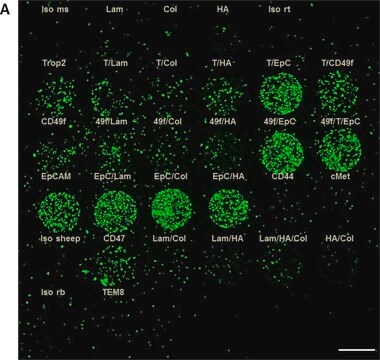推薦產品
生物源
mouse
品質等級
共軛
unconjugated
抗體表格
purified immunoglobulin
抗體產品種類
primary antibodies
無性繁殖
polyclonal
形狀
buffered aqueous solution
物種活性
human
技術
western blot: 1 μg/mL
NCBI登錄號
UniProt登錄號
運輸包裝
dry ice
儲存溫度
−20°C
目標翻譯後修改
unmodified
基因資訊
human ... CD68(968)
一般說明
This gene encodes a 110-kD transmembrane glycoprotein that is highly expressed by human monocytes and tissue macrophages. It is a member of the lysosomal/endosomal-associated membrane glycoprotein (LAMP) family. The protein primarily localizes to lysosomes and endosomes with a smaller fraction circulating to the cell surface. It is a type I integral membrane protein with a heavily glycosylated extracellular domain and binds to tissue- and organ-specific lectins or selectins. The protein is also a member of the scavenger receptor family. Scavenger receptors typically function to clear cellular debris, promote phagocytosis, and mediate the recruitment and activation of macrophages. Alternative splicing results in multiple transcripts encoding different isoforms. (provided by RefSeq)
免疫原
CD68 (NP_001242.2, 1 a.a. ~ 354 a.a) full-length human protein.
Sequence
MRLAVLFSGALLGLLAAQGTGNDCPHKKSATLLPSFTVTPTVTESTGTTSHRTTKSHKTTTHRTTTTGTTSHGPTTATHNPTTTSHGNVTVHPTSNSTATSQGPSTATHSPATTSHGNATVHPTSNSTATSPGFTSSAHPEPPPPSPSPSPTSKETIGDYTWTNGSQPCVHLQAQIQIRVMYTTQGGGEAWGISVLNPNKTKVQGSCEGAHPHLLLSFPYGHLSFGFMQDLQQKVVYLSYMAVEYNVSFPHAAQWTFSAQNASLRDLQAPLGQSFSCSNSSIILSPAVHLDLLSLRLQAAQLPHTGVFGQSFSCPSDRSILLPLIIGLILLGLLALVLIAFCIIRRRPSAYQAL
Sequence
MRLAVLFSGALLGLLAAQGTGNDCPHKKSATLLPSFTVTPTVTESTGTTSHRTTKSHKTTTHRTTTTGTTSHGPTTATHNPTTTSHGNVTVHPTSNSTATSQGPSTATHSPATTSHGNATVHPTSNSTATSPGFTSSAHPEPPPPSPSPSPTSKETIGDYTWTNGSQPCVHLQAQIQIRVMYTTQGGGEAWGISVLNPNKTKVQGSCEGAHPHLLLSFPYGHLSFGFMQDLQQKVVYLSYMAVEYNVSFPHAAQWTFSAQNASLRDLQAPLGQSFSCSNSSIILSPAVHLDLLSLRLQAAQLPHTGVFGQSFSCPSDRSILLPLIIGLILLGLLALVLIAFCIIRRRPSAYQAL
生化/生理作用
CD68 (Cluster of Differentiation 68), a scavenger receptor, significantly participates in the development of Alzheimer′s disease. CD68 serves as a prognostic marker in tumor cells. Deletion of the gene is known to cause reduction in the bone resorption capacity.
外觀
Solution in phosphate buffered saline, pH 7.4
免責聲明
Unless otherwise stated in our catalog or other company documentation accompanying the product(s), our products are intended for research use only and are not to be used for any other purpose, which includes but is not limited to, unauthorized commercial uses, in vitro diagnostic uses, ex vivo or in vivo therapeutic uses or any type of consumption or application to humans or animals.
未找到適合的產品?
試用我們的產品選擇工具.
儲存類別代碼
10 - Combustible liquids
閃點(°F)
Not applicable
閃點(°C)
Not applicable
分析證明 (COA)
輸入產品批次/批號來搜索 分析證明 (COA)。在產品’s標籤上找到批次和批號,寫有 ‘Lot’或‘Batch’.。
Dawn O'Reilly et al.
The Journal of biological chemistry, 278(24), 21909-21919 (2003-04-05)
CD68 is a transmembrane glycoprotein expressed in all cells of the mononuclear phagocyte lineage including monocytes and tissue resident macrophages. Deletion analysis of the 5'-flanking sequences of the gene demonstrated that the proximal -150-bp sequence of the CD68 promoter exhibits
Evaluation of the effects of anti-psychotic drugs on the expression of CD68 on the peripheral blood monocytes of Alzheimer patients with psychotic symptoms.
Bahramabadi R, et.al.
Life Sciences, 179, 73-79 (2017)
Dimitry A Chistiakov et al.
Laboratory investigation; a journal of technical methods and pathology, 97(1), 4-13 (2016-11-22)
CD68 is a heavily glycosylated glycoprotein that is highly expressed in macrophages and other mononuclear phagocytes. Traditionally, CD68 is exploited as a valuable cytochemical marker to immunostain monocyte/macrophages in the histochemical analysis of inflamed tissues, tumor tissues, and other immunohistopathological
CD68/macrosialin: not just a histochemical marker.
Chistiakov DA
Laboratory Investigation; a Journal of Technical Methods and Pathology, 97(1), 4-13 (2017)
Reza Bahramabadi et al.
Life sciences, 179, 73-79 (2017-05-04)
Previous studies approved the important roles of CD68, as scavenger receptors, in Alzheimer's disease (AD). The aim of this study was to evaluate the effect of treatment with anti-psychotic drugs and vitamin B12 on the expression levels of CD68 in
我們的科學家團隊在所有研究領域都有豐富的經驗,包括生命科學、材料科學、化學合成、色譜、分析等.
聯絡技術服務